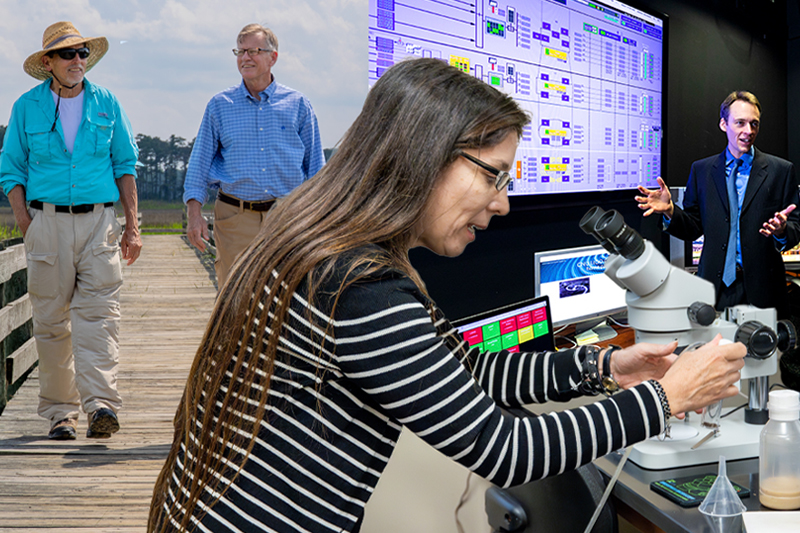
Read time:
Grants awarded to CNU in response to faculty proposals this year have skyrocketed to a 15-year high, providing crucial funding for projects that expand the pursuit of new knowledge on campus and in the community.
So far, new grants total $4.5 million, with several months in the budget year remaining. Last year, new grants totaled $3.4 million. This year’s new grant total does not include the $7.4 million in ongoing multi-year grants, which brings the current combined total of new and multi-year grants to $11.9 million.
The grants power research projects that offer students across all majors dynamic opportunities, including working at Jefferson Lab in Newport News, developing advanced open-source robot control software, studying gut health, and looking closely at the environment of nearby Ragged Island. There are also two grants awarded by the State Council of Higher Education for Virginia (SCHEV) directed at expanding internship offerings.
Undergraduate research is a cornerstone of a CNU education, fueling Captains’ career trajectories and successes.
“Grants impact CNU by providing funding for the stellar research that our faculty are doing. They have a dramatic impact in their fields, collaborations and prospects for students,” said Anne Pascucci, Director, Sponsored Programs. “The conversations that happen not only between faculty but between faculty and students bears this out constantly. Hearing about careers our alum embark upon after their experience in an environment like this gives us hope.”
In addition to the increase in research dollars, Christopher Newport also recently earned the prestigious “Research Colleges and Universities” designation from the Carnegie Classification.
“Our faculty are truly living up to the recent research designation by Carnegie, but the Center for Student Success has also contributed significantly with scholarships and internships for students,” said Dr. Lynn Lambert, Associate Provost of Research and Dean of Graduate Studies. “Our faculty are productive, renowned scholars engaging undergraduates in their world-class research.”
The grants hail from a variety of federal, state and private sources. The highest number comes from the National Science Foundation. The second largest source is SCHEV. NASA, Jefferson Lab, and NOAA also rank high, with each providing more than $1 million in grants to Christopher Newport professors. The School of Engineering and Computing (SEC) receives the most grants, $7.1 million out of the $11.9 million.
“We have been very successful this year with and last year with SCHEV grants, unlike previous years. That is going to have an enormous impact on our students,” Lambert said. ”We also have been more successful with National Institutes of Health (NIH) grants. Breaking into this incredibly difficult field is another indication of CNU’s increasingly strong reputation for expertise in this area.”
Dr. James Kelly, an associate professor of Mathematics, received a grant that helps bring mathematicians from all over the world to an annual event, the Spring Topology and Dynamics Conference, at CNU.
“Many of those people were not familiar with CNU prior to this conference, but now they know CNU is a place where meaningful research takes place,” he said.
For Dr. David Conner, associate professor in the School of Engineering and Computing, a Naval Engineering Education Consortium grant has fostered a partnership with Dahlgren, giving students a chance to contribute to open-source software used by the worldwide Robot Operating System community.
“Grants provide the funding and motivation, but it is the work done under the grants that provides the ‘experiential learning’ opportunities for students to apply their coursework on real, open-ended research problems,” Conner said. “It helps students develop new skills, refine their career goals and tackle real world problems, while interacting with a worldwide community of researchers and developers.”